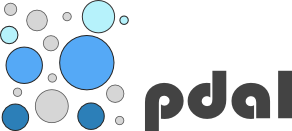Dr. Adam Steer
https://spatialised.net
@adamdsteer
adam@spatialised.net
A lot has changed in PDAL since 2018, and I no longer use Amazon Web Services to host data. Some parts of this workshop do not work as advertised until data can be migrated to a new host. Others may work better with newer PDAL features. An update is slowly arriving...
This repository contains materials for a point cloud processing workshop developed by Dr. Adam Steer, originally for the FOSS4G SotM Oceania conference in 2018.
It uses the Point Data Abstraction Library (PDAL), Entwine Python, Numpy, Jupyter notebooks, and the Potree point cloud visualiser to develop some concepts about processing point clouds and visualising results.
This workshop uses common point cloud data analysis tasks to demonstrate 'thinking in PDAL'. Using both lidar and photogrammetric data, users are shown how to apply a range of simple strategies to construct complex workflows. These are demonstrated using a command line interface, then using configuration files to hold common parameters, then using Python for running processes and exploratory visualisation. The workshop also shows how to run tasks using PDAL in a docker container.
At the end of the workshop users should have a greater understanding of how PDAL's pipeline architecture works, and some ideas about how to apply it in their own data analysis tasks.
PDAL's authors maintain a workshop here: https://pdal.io/workshop/index.html . It is a fantastic tour of PDAL's diverse capabilities, and you should take that workshop as well! The reason I wrote this workshop was to focus on some end to end workshop examples. This workshop leaves out a huge amount of PDAL capability in order to:
- focus on some simple, commonly-used patterns.
- reiterate the PDAL approach in a different way to how it is explained in the main PDAL workshop, building from commands to pipelines and simple Python integration
I see this as completely complementary to the main workshop - which should keep its character as a tour de force of PDAL, I hope you do also.
Text relating to the workshop is contained in workshop. Jupyter notebooks used in the workshop are contained in notebooks. Sample workflows as PDAL pipelines are contained in resources.
This workshop requires a PDAL installation with python bindings. Using the minified Conda package manager is convenient and works across Linux, MacOS and Windows. A native installation should work just fine as well. However PDAL is installed, it needs to be at least release 2.1, and be visible to a Jupyter notebook.
Using Conda, create a new virtual environment like:
conda create -n f4g-pdal-workshop python pdal=2.1 python-pdal entwine jq numpy pandas matplotlib jupyter scipy seaborn -c conda-forge
(for now, please keep to PDAL version 2.1 - a kind tester has identified an issue with PDAL 2.2 and some of the exercises. Fixes are coming!)
This creates a virtual environment with PDAL, PDAL Python bindings, and Entwine installed, using the conda-forge channel. It also installs the jq command line utility, for parsing PDAL's metadata responses. Numpy, Pandas, Matplotlib and Jupyter are all Python packages for data manipulation and visualisation.
To use the new environment head to a command line interface, switch to the exercises directory in this repository and type:
conda activate f4g-pdal-workshop
..and then:
jupyter notebook
...to get access to the processing notebooks.
PDAL uses a modular filter system, and some things we want to use are not included in Conda builds. We can also use dockerised PDAL, which you can get via:
docker pull pdal/pdal
Instructions for dockerised processing are included in the notebooks.
To visualise some data products, please ensure you have:
- QGIS or an alternate viewer for geoJSON and georeferenced raster data
- CloudCompare or an alternate LAS/LAZ file viewer
...especially if you're not using Jupyter notebooks to run tasks.
For command line processing and demonstrating PDAL in Python we'll use airborne lidar data: https://s3.amazonaws.com/f4g-pdal-workshop-sampledata/T_316000_235500.laz
This data sample comes from the New York University LiDAR survey of Dublin, Ireland: https://geo.nyu.edu/catalog/nyu-2451-38684
For PDAL pipelines and Entwine we'll work on drone data, processed into a point cloud using structure-from-motion techniques: https://s3.amazonaws.com/f4g-pdal-workshop-sampledata/APPF-farm-sample.laz
This data sample was collected by the Australian Plant Phenomics Facility (http://appf.edu.au).
Please download these ahead of the workshop.
Feel free to explore and use the workshop materials as you see fit, acknowledgment is appreciated. All data samples used in this workshop are licensed CCBY4 and available in public repositories.
I'd also be very happy to run this workshop and customised variations of it for your organisation - please contact me for details and pricing.

